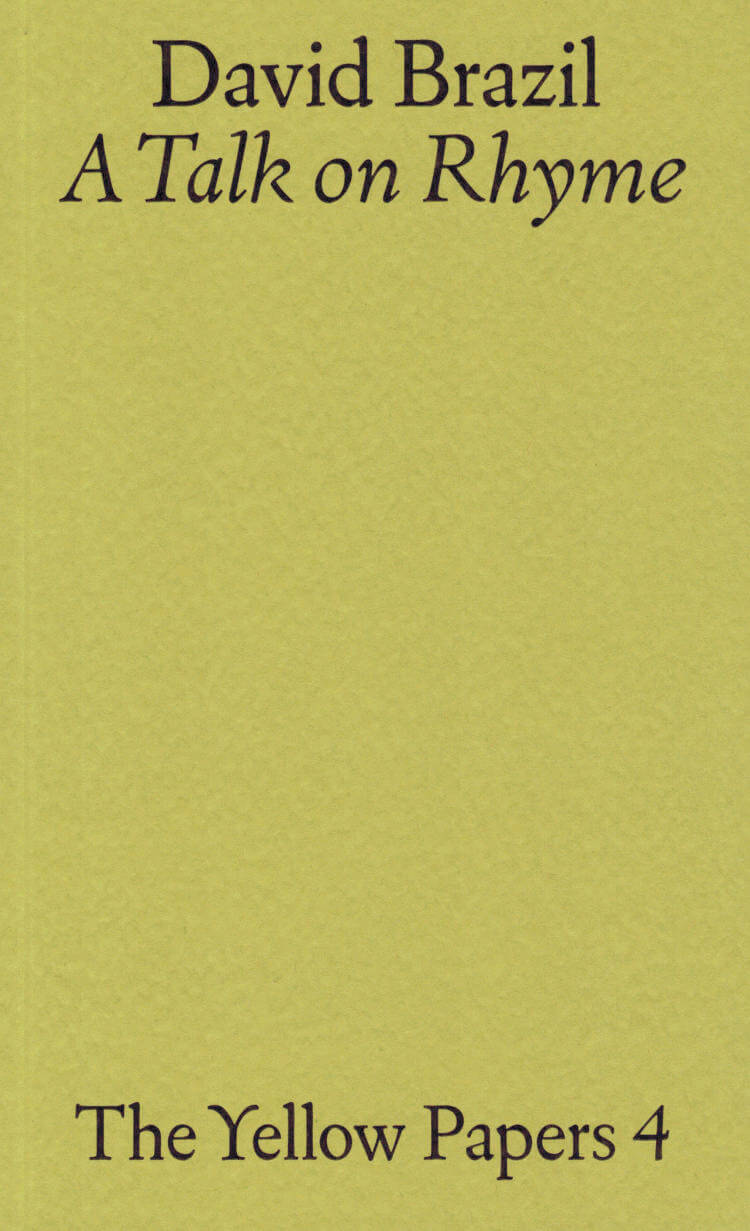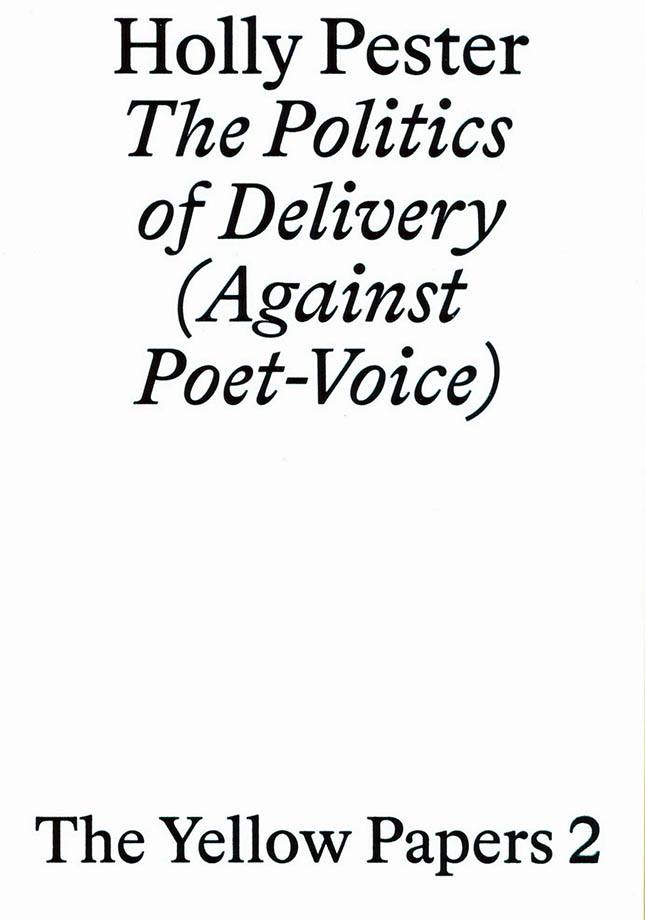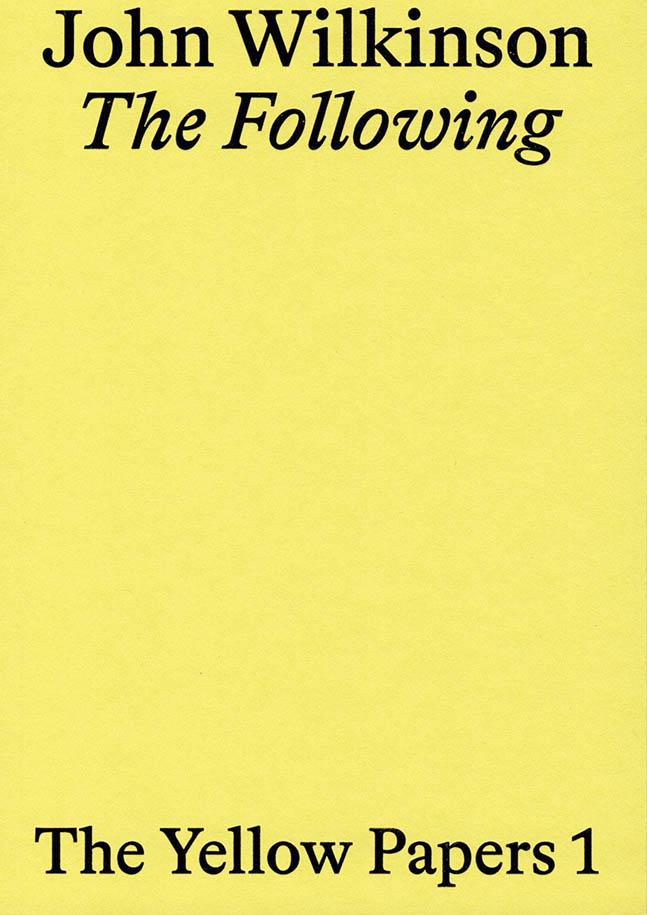The Yellow Papers
The Yellow Papers

Delirious Verse
Delirious Verse presents the first English translation of a talk given by the Italian poet Amelia Rosselli in the early 1980s, in which she read aloud from and expanded upon her seminal essay “Metrical Spaces.” Drawing on intensive literary and musical studies, and shaped by her trilingual upbringing as a refugee from fascist Italy, Rosselli conceptualizes a new kind of poetic form: a graphic-prosodic “time-space” capable of containing “all possible imaginable rhythms.”
The book includes a new translation of “Metrical Spaces” by Jennifer Scappettone and an afterword by Andrea di Serego Alighieri.
Edited and translated by Andrea di Serego Alighieri and Phil Baber.

Five Essays from Present Continuous
The five essays printed here are excerpted from Part I of Present Continuous, a book of prose written during the first year of the coronavirus pandemic between March 2020 and April 2021 in Lewisham, London.
The essays in the present volume were written between March 2020 and June 2020: the movement from spring to summer, from the first announcement of a national lockdown to the Black Lives Matter protests sparked by the murder of George Floyd and Breonna Taylor in the United States and the death of Belly Mujinga in the UK. Nearly two years on, following a seemingly endless series of virus variants and subvariants, an apparent shift from pandemic to endemic, and a kind of exhaustion of vocabulary and will, I hope they provide some sort of record, not just of where “we” were in 2020, but where “we” are – or might be – now. (David Grundy, London, January 2022)
“It’s 2018 and we’re still on a train out of London, it’s 1967 or 1970 and Coltrane and Ayler are still in their material form, it’s 1943 and Artaud’s letters spill their remainder on the page, it’s April 2020 and all those presences are gone but their traces remain in the split voice, the overtone, the greater frequency overwhelming that base note which no longer guides in circumscribed lines. The actual presence of actual ghosts, silver on the mirrors, lost poetry, the noise it makes. It’s from the condition of being in the abyss itself that we learn how to climb out of it.”

A Talk on Rhyme
In A Talk on Rhyme, a text distilled from a lecture given in 2014, poet David Brazil reflects on rhyme’s “emergence, progress, inoperativity, and prospect.” The Talk is supplemented by an essayistic bibliography on subjects ranging from classical prosody to American folk music, via writings on and by poets long dead whose names are obvious: Saint Paul, Dickinson, Herbert, Spicer, Hölderlin, Dante, O’Hara.

The Politics of Delivery (Against Poet-Voice)
An essay by Holly Pester on prosody, “poet-voice,” and the politics of delivery.
“Following a political impulse that I cannot shake, I want to oppose poet-voice. Not to smirk, but to suggest that poet-voice, that is, to lay a given mutual voice on top of the text, is a kind of opting out. It’s a self-absolving move. What’s being opted out of is the rough stuff of delivery and the ethical shrapnel in intonation. Such materials of poetic intonation are not, I will argue, irrelevant to the political questions of one’s speech in society and its disputed freedoms.
I have a fully felt and fraught relationship with delivery. I care about delivery compositionally; I enjoy the effects of composition working on and into my voice. Sometimes it feels as if my voice is the victim of some impossible contract with the text. The effort and timbres of delivery are therefore potentially very significant to a political poet. This sounded aspect of my work often gets short-handed as performance, but it’s not that. Performance art and performance poetry are distinct art forms with histories and styles, learned and studied by talented performers. Delivery is as banal or as eccentric as the material, but not necessarily correspondingly. It is part of the craft of poetry that isn’t unrelated to the intrinsic vocal identity of the poet (accent, etc.) yet has as much to do with tensions within the communities, heritages, and civics of poetry as with the individual. ”

The Following
The Following selects from John Wilkinson’s essays of the last three decades, with a preference for what has come to be known as creative criticism, and adds a new essay on reflected boughs in poems by Shelley and a photograph by Sally Mann, and a poem in homage to Sean Bonney. The book’s title is a broken reflection of the essay title “Following the Poem.”
“Through following a poem (not just any poem), a reader can become involved in the evocation and enactment of a radical hybridity, pulling together ways of thinking about the world modernity has categorically but falsely separated; but such reading takes place in time, so continuously a reader unpicks and reintegrates elements of the poem in a felt motion which can restore a healed and full being in the world, involving in its fullness and as a condition of it, the detours, the lapses, and the breaks in his or her journey.”